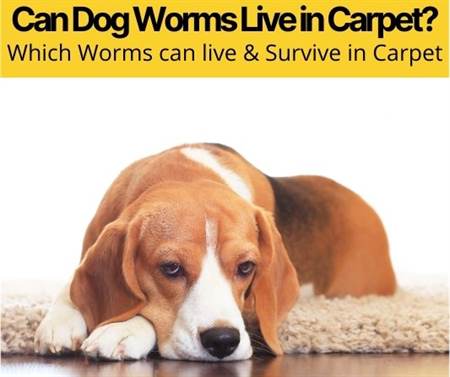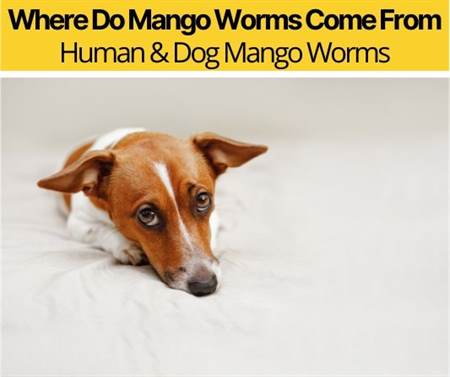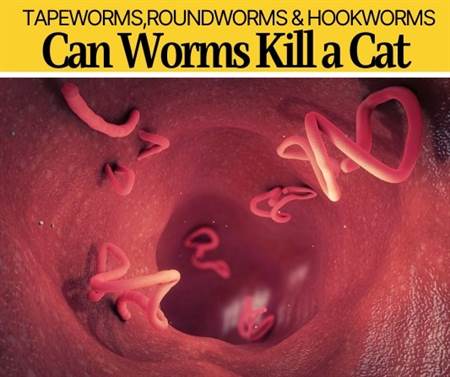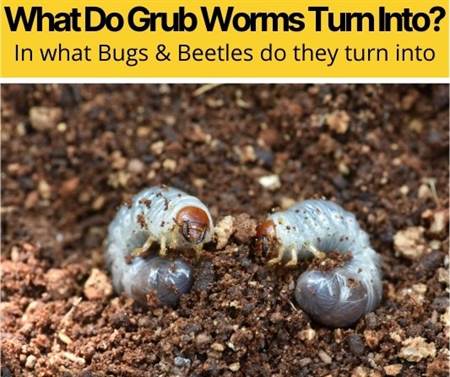 By nature, domestic dogs are affectionate, caring, and protective of those that they feel are a part of their pack, and this is especially true when it comes to their puppies.
By nature, domestic dogs are affectionate, caring, and protective of those that they feel are a part of their pack, and this is especially true when it comes to their puppies.
With that in mind, it would probably surprise you to know that mother dogs are most often the cause of a newborn puppies’ worms.
In this article we will see How common it is, what worms are puppies born with, and how dangerous they can be.
Why Are Puppies Born with Worms?
When a female dog gets pregnant, if she has worms, those worms can often be given to her puppies. The most common worm for a dog to be infested with is the roundworm, and these worms are able to transfer from a mother dog to her puppies while those puppies are still growing inside of her.
How Common are Worms in Newborn Puppies
Many puppies are either born with worms already in their intestinal tract or they often get them shortly after birth. Because this is such a common occurrence with puppies, veterinarians have developed a suggested deworming schedule for puppies that starts at just two weeks of age.
Is it Normal for Newborn Puppies to Have Worms?
While not all puppies are born with worms, and some never develop worms, the fact is that worms do occur in newborn puppies quite often. Some puppies get worms from their mothers while they are still growing inside their mother’s uterus. Other puppies get worms after they are born from nursing. In either case, these worms are gotten when the mother dog is infested with the worms first.
Some veterinarians will take a stool sample from newborn puppies to determine if they have worms and then treat them if they test positive. Most often, veterinarians recommend that all puppies be dewormed as a precaution and a preventative measure.
Deworming is recommended without a stool sample and is suggested starting at two weeks of age and done every two weeks until they are about twelve weeks old and weaned from their mothers.
Are All Puppies Born with Worms?
No, all puppies are not born with worms. Dogs are especially susceptible to a wide array of parasites. Just one kind of those parasites are worms. Most commonly, dogs become infested with roundworms and hookworms. Parasites like these can and often do happen throughout the life of a dog.
Percentage of Puppies Born with Worms
It is estimated that roughly thirty percent or more of all puppies will end up infested with a form of intestinal parasite before they reach six months of age. Those that are infested after birth may get worms from nursing from their mothers or from fecal matter that contain the worms.

Worms Newborn Puppies can Have
Dogs and their puppies can get a wide array of parasites. Typically, there are seven common parasites that dogs get. These parasites include coccidia, heartworm, hookworm, ringworm, roundworm, tapeworm, and whipworm. These are the pests that most often plague a dog.
Are Puppies Born with Heartworms?
Puppies are not born with heartworm. Heartworm is derived from mosquito bites. Heartworm infestation causes damage to a dog’s lungs and heart. Veterinarians highly recommend heartworm prevention for all dogs and puppies because it’s an exceedingly difficult parasite to kill.
In the event that a puppy or dog survives heartworm and its treatment, the dog most often suffers irreparable harm and will usually deal with health issues to some extent.
Puppies can get heartworm after their birth, though. A veterinarian can test for heartworm by doing a blood test. Unfortunately, when it comes to heartworm, it takes six months for it to grow and develop enough to show up on the test.
Dog owners should keep an eye out for uncharacteristic fatigue, lethargy, or a barking “cough.” Additionally, ensuring that your dog is on a good heartworm prevention regimen and sees their vet for annual checkups are all important steps to successfully prevent heartworm infestation.
Are Puppies Born with Roundworms?
Roundworm is one of the most common parasites that dogs get. The roundworm is generally about twelve centimeters in length. Dogs and puppies who become infested with the roundworms can experience diarrhea, slimy or mucus-like poop, cause the animal to become weak, and it can also cause them to vomit.
In puppies and adolescent dogs that are still growing, a roundworm infestation can cause the puppy to have issues growing properly. If untreated or not properly treated, a puppy may never mature to the healthy adult size that they typically would have.
They may also experience long term health issues resulting from not getting proper nutrition due to the parasite while growing.
Luckily, when treated with dewormer and when a proper deworming schedule is followed by dog owners, most often roundworms cause no damage or long-term effects to your dog or their puppies.
Are Puppies Born with Hookworms?
As far as intestinal parasites go, hookworms are by far the most dangerous, and sometimes most deadly. The hookworm is an intestinal parasite. Like the roundworm, a puppy can contract the worms from their mother while still in their uterus or after their birth from nursing on an infested mother.
While roundworms are sometimes found in a puppy’s poop, the hookworm generally is not. Instead, puppy owners may notice that their dog, puppy, or a new litter of puppies appear lethargic, are not interested in eating, have blood in their poop, have poop that is black and resembles tar, or find signs of anemia such as pale white gums or tongue.
If a deworming regimen is properly followed, then your newborn or young puppy should be able to expel the hookworms and recover from the damage that having such parasites can cause them. However, if left untreated, hookworms will kill the puppy or dog.
In fact, a puppy will succumb to the devastation of the hookworm much faster than an adolescent or adult dog. For this reason, it is important to keep a close eye on newborn puppies and adult dogs. Ensure that they are dewormed on a veterinarian-recommended schedule and that you have them seen by your vet as soon as you notice an issue. Early intervention is one of the best solutions to helping your animal.
Are Puppies Born with Tapeworms?
Tapeworms are not as common in dogs or puppies as the roundworm, hookworm, or whipworm. Dogs can still acquire tapeworms, though. The most commonly noted way that any dog acquires tapeworm is from fleas. Though that is not the only way that a dog can get tapeworms.
Like any parasite, puppies that are still growing inside their mothers can become infested if their mother has worms or develops them during the pregnancy. However, it is far more common for puppies to get tapeworm after they are born.
Tapeworms most often come from fleas or other animals. Puppies and dogs become infested with tapeworm by eating the tapeworm egg or baby tapeworms. This can very easily happen when a dog or puppy licks itself in order to get clean or licks another animal. With the most common household animals that carry the tapeworm eggs or baby tapeworms on their coats or feathers being birds, cats, other dogs, ferrets, gerbils, guinea pigs, hamsters, mice, rabbits, and rats.
Tapeworm, unlike other parasites, are a lot easier to spot, and they typically cause less damage if you are properly worming your puppy, adolescent dog, or adult dog based on appropriate veterinarian recommended deworming schedules. While a dog or puppy with tapeworm may eat more and gain no weight while doing so, tapeworms shed segments.
This means that a puppy or adult dog will have small segments from the tapeworm in their poop, around their anus, or even on the underside of the tail. These little flecks of worm look a lot like rice and are easy to spot if you are looking for them.
Ensuring that puppies are treated for fleas and kept on a regular flea treatment regimen is one of the best and easiest steps that a pet owner can do to prevent tapeworms in addition to following a proper deworming schedule for their puppies and deworming their adult dogs as directed by their vet.
Read More: How to Kill Dog Fleas with Bleach
Are Puppies Born with Whipworms?
Whipworms are most often found in a puppy or dogs’ typical environment. They are shed through a dog’s fecal matter. For roughly two months or sixty days, the whipworm stays alive after being expelled from the system of the infested dog. For that sixty-day period, the whipworm babies will infest other puppies and dogs that come in contact with that specimen.
One of the simplest ways that a pet owner can cut down on the risk of spreading whipworm, in addition to deworming their dogs based on veterinarian recommendations, is to clean up their dog’s waste.
This is especially true when taking your dog to public spaces such as walking them through a neighborhood, to a local dog park, on public hiking trails, and other similar public areas.
Dog owners should look for signs of diarrhea, blood in their puppy’s stool, and signs of anemia as indicators that something might be wrong and that their dog may have contracted an intestinal parasite.
How Many Worms Can A Newborn Puppy Have
There is no set number on how many worms a puppy can have or how infested they will become. Puppies and dogs can have several different types of worm all at the same time. Worse still, worms grow and breed inside the perfect animal host because they offer them the perfect home and food source. If left untreated, or if the infestation goes unnoticed for too long, then your puppy or adult dog may not be able to recover from the damage caused by having a parasite.
Are Worms Dangerous to A Newborn Puppy
The short answer is yes. Worms are dangerous to newborn puppies. The younger the dog, the more dangerous having parasites can be to the animal. Newborn puppies are especially susceptible and are much more likely to succumb to death from the damage parasites cause.
Newborn puppies need every bit of nutrition and vitamins that they take in. A single worm can begin to devastate a puppy’s health. A severe infestation can be catastrophic and quickly lead to death, especially in newborn puppies.
Because of the damage worms and other parasites can cause, especially to newborn and young puppies, veterinarians strongly recommend a deworming schedule starting when a puppy is just two weeks old.
Related: Can Dog Worms Live in Carpet
Can A Newborn Puppy Die If It has Worms?
Yes, worms can kill a newborn puppy. If the mother dog has worms or other parasites while she is pregnant and they are passed onto the puppies, it is even more likely that the puppies will suffer serious health issues and even death if they contract the worms while they are still growing inside their mother.
How Does a Puppy Act When it has Worms
When a dog contracts worms, there are an array of symptoms that should pop out as abnormal to a dog owner, and that should alert you to a problem. Keep an eye out for your dog if they become lethargic, sleep much more than usual, stop eating or seem uninterested in food, lose weight even if they are eating well, develop a fat or swollen belly and relieving themselves does not take the swelling down, begin having diarrhea, or they begin vomiting. These symptoms should alert dog owners and breeders that there is something seriously wrong with their pet.
When Should A Puppy Be Dewormed
Newborn puppies should be dewormed at two weeks, four weeks, six weeks, eight weeks, and twelve weeks. This new puppy deworming schedule ensures that the puppy is dewormed for any parasites that they may have developed while growing inside their mother and any parasites that they acquired from nursing.
After the initial twelve-week period, most veterinarians recommend that puppies be dewormed again at six months and at one year of age. Once a dog is one-year-old, veterinarians recommend that dogs, along with many other domestic or agricultural animals, be dewormed at least twice to four times a year every year for the life of your pet. This deworming schedule helps to prevent infestation and clear out any existing infestation.
In addition to treating your puppy or dog regularly to prevent intestinal parasites, it is also highly recommended that dog owners also keep their dogs on a heartworm prevention medication.
For those that adopt or purchase a pet, it is recommended that they be dewormed as soon as you get them. Additionally, it is further recommended that you again deworm them two weeks after their first worming. Once that has been completed, you can then put them on a schedule to deworm them two to four times a year depending on where you live, the types of parasites that are native to your area, and the exposure rate that your pet experiences.
It’s important to understand that deworming can cure your pet of any existing infestation from internal parasites, however, there is no one way to prevent your animal from getting every type of worm or other parasites. So, heartworm prevention, regular deworming, and keeping an eye on your pet’s health are the best ways for a pet owner to protect their pet from such occurrences.
Many deformers can be purchased over the counter at a local grocery store, feed store, pet supply shop, or anywhere else that pet items are sold. Additionally, your veterinarian can prescribe a prescription for heartworm prevention and for more severe cases of intestinal parasite.
Related Questions.
How Long will My Puppy Poop Worms after Deworming?
The amount of time that a puppy or dog will expel worms in their stool after deworming depends on a few things. First, it will depend on the type of worm or intestinal parasite you pet has. Next, it will depend on how infested the animal has become, especially if this is their first deworming and you know for sure that they do have intestinal worms. Finally, it will depend on how effective the medication used has been on killing the parasite.
A good and effective dewormer will begin roughly twelve hours after you or your veterinarian has given the puppy or dog the deworming medication. Pet owners may see worms in their dogs poop for several days to a week while their system purges the parasitic worms. Sometimes it can take a little longer than this if your puppy or adult dog was badly infested with worms.
However, if you’re still seeing worms in your dog’s stool after a couple of weeks, the worms are moving still, and they are bright in color then its time to see the vet again to ensure that the medication is working or to decide if further treatment is necessary.
How Easy is it to Get Roundworm from a Puppy?
Humans are at great risk of getting roundworm if their dog, new puppy, or dog that they have had close contact with recently is infested with roundworm. Humans should be very conscious of proper handwashing after handling their new puppy or a stranger’s dog. The same can be said if a dog owner knows their dog is infested or was recently infested with roundworm.
Some things that you can do to reduce your risk to roundworm include using a doggie poop collection bag, ensuring that you clean up your pet’s waste even in your own yard and wash your hands thourally after cleaning up after your pet. It can also be very helpful to bathe your dog regularly especially if they are inside your home or office frequently, are allowed on your furniture, and if they are allowed to be on or sleep in your bed.
Pet owners and animal lovers alike should understand how susceptible they may be to catching roundworm. They should also understand that catching roundworm can cause health risks to them, especially if it is to go untreated. In humans, round worm can cause several health issues that can effect sight, the respiratory system, heart, and problems with your brain. Any of these issues could be devastating to humans long term if the parasite infests a human and goes untreated for too long.






